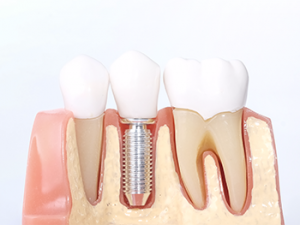Dental Implants
 Implant-Supported Crowns
Implant-Supported Crowns
Modern dental crowns are highly customizable restorations that restore and reinforce cracked, fractured, or broken teeth. In some cases, they may even be used for cosmetic purposes to build-up worn tooth structure or conceal stubborn tooth discoloration. At Dr. Lerner’s Practice, we can also place lifelike dental crowns on prosthetic dental implants, which are root-like posts that are inserted into the jawbone after you’ve lost a tooth. In addition to closely mimicking your healthy, natural tooth’s appearance, an implant-supported crown also helps you preserve your long-term oral health by re-establishing the supportive root of your lost tooth.
What is an Implant Crown?
A dental implant is a small post that is typically made from biocompatible titanium, and designed to support your replacement crown the way a root supports your natural, healthy tooth. After an implant post is placed, your jawbone will heal to the post’s surface, securing it in place with more stability than any other prosthetic option. Once your jawbone has healed around the implant post, Dr. Lerner can affix a custom-designed crown to the post, completing your smile’s restoration with highly lifelike results.
Implant Crowns Compared to Traditional Bridges
Before implant crowns became popular, dental bridges were the most common way to replace lost teeth. A bridge consists of a custom prosthetic tooth, or pontic, that fits comfortably in the space left by your missing tooth. The pontic is supported by crowns that are bonded to nearby healthy teeth (or abutment teeth), holding the pontic securely in place. By contrast, an implant crown replaces the lost tooth without the need to modify healthy tooth structure for support. Because the crown affixed to a dental implant posts, it also offers more comprehensive benefits for your oral health.
The Benefits of Implant-Supported Crowns
The crown portion of an implant crown offers a number of benefits, including restored bite function and the improved appearance of your smile. However, the more significant benefits involve the implant post, which replaces your lost tooth root and the vital functions that it was responsible for. Such benefits include:
- Improved comfort and support for your replacement tooth.
- Improved confidence when you bite, chew, speak, and smile.
- Improved jawbone health and integrity, which means reduced risks of further tooth loss.
- Maximum preservation of your remaining healthy, natural tooth structure.